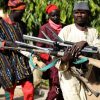The World Bank opens up on low food production, says conflict, displacement and low agricultural productivity hindered Nigeria and some African countries from becoming self-sufficient in food production. It was said in a new report on Wednesday by the Washington D-based lender, titled ‘Insect and Hydroponic Farming in Africa: The New Circular Food Economy.’ World
The World Bank opens up on low food production, says conflict, displacement and low agricultural productivity hindered Nigeria and some African countries from becoming self-sufficient in food production. It was said in a new report on Wednesday by the Washington D-based lender, titled ‘Insect and Hydroponic Farming in Africa: The New Circular Food Economy.’
World Bank speaks on low food production.
The report noted that undernourishment from food insecurity was high in about 10 African countries, with Nigeria having the most undernourished people of about 24.7 million in 2018.
“Undernourishment from food insecurity was high in each of the 10 African fragility, conflict, and violence-affected countries even before the COVID-19 pandemic.
In 2018, Nigeria had the most undernourished people, with 24.7 million, followed by Mozambique, 9.6 million; Chad, 6.1 million; Sudan, 5.2 million; Burkina Faso, 3.8 million; Liberia, 1.8 million; Cameroon, 1.6 million; the Republic of Congo, 1.5 million; Mali, 1.0 million; and The Gambia, 0.3 million,” the report read in part.
Going back to 2001 to 2018, the number of undernourished people increased by 13.3 million in Nigeria, adding that 36.8 per cent of Nigerian children under the age of five had stunted growth.
“High stunting rates are associated with long-term negative impacts on cognitive and physical development, which can adversely affect human capital accumulation and economic growth,” the report added.
The report also read in part, “African FCV countries rely on food imports to ensure food supplies. Conflict, forced displacement, and low agricultural productivity keep Africa FCV countries from being self-sufficient in food production. “
In the area of forced displacement, the report said that Nigeria lost about 900,000 people between 2002 and 2017, adding that about 296,000 people fled Nigeria in 2019.
It also stated that there were 2.6 million internally displaced persons in Nigeria by the end of 2019.


















Leave a Comment
Your email address will not be published. Required fields are marked with *